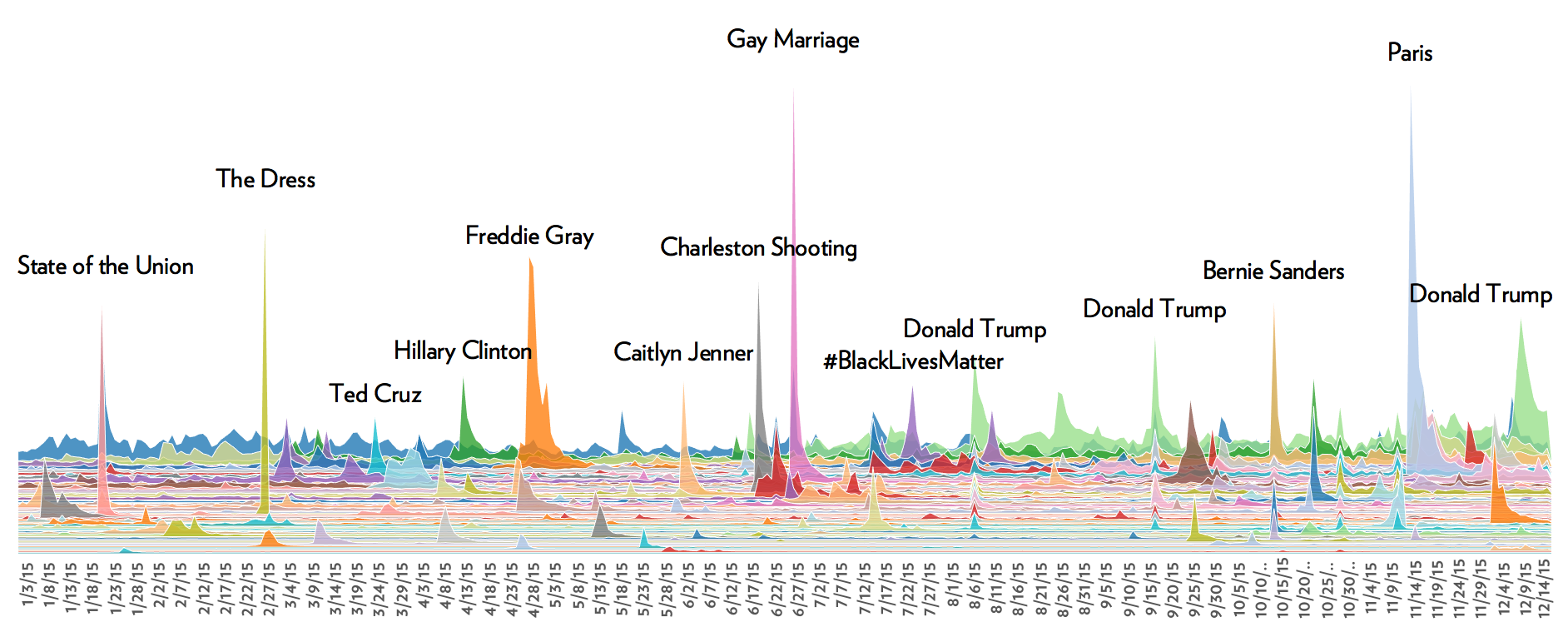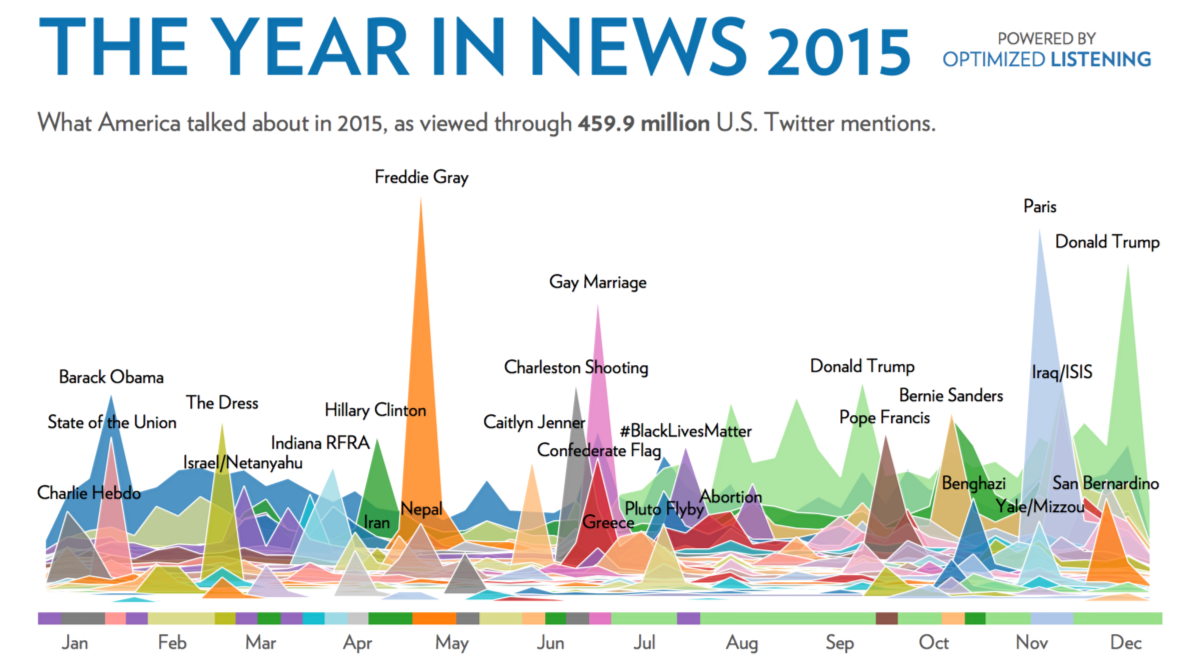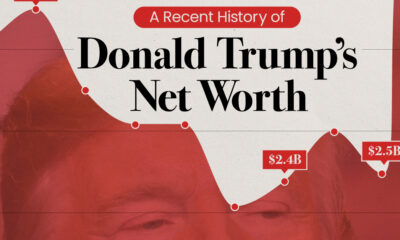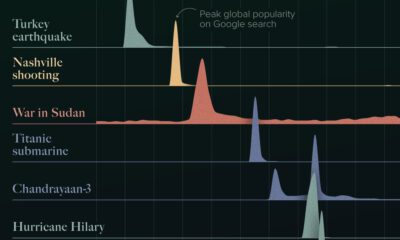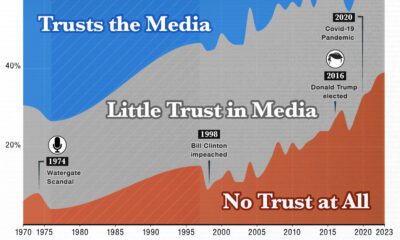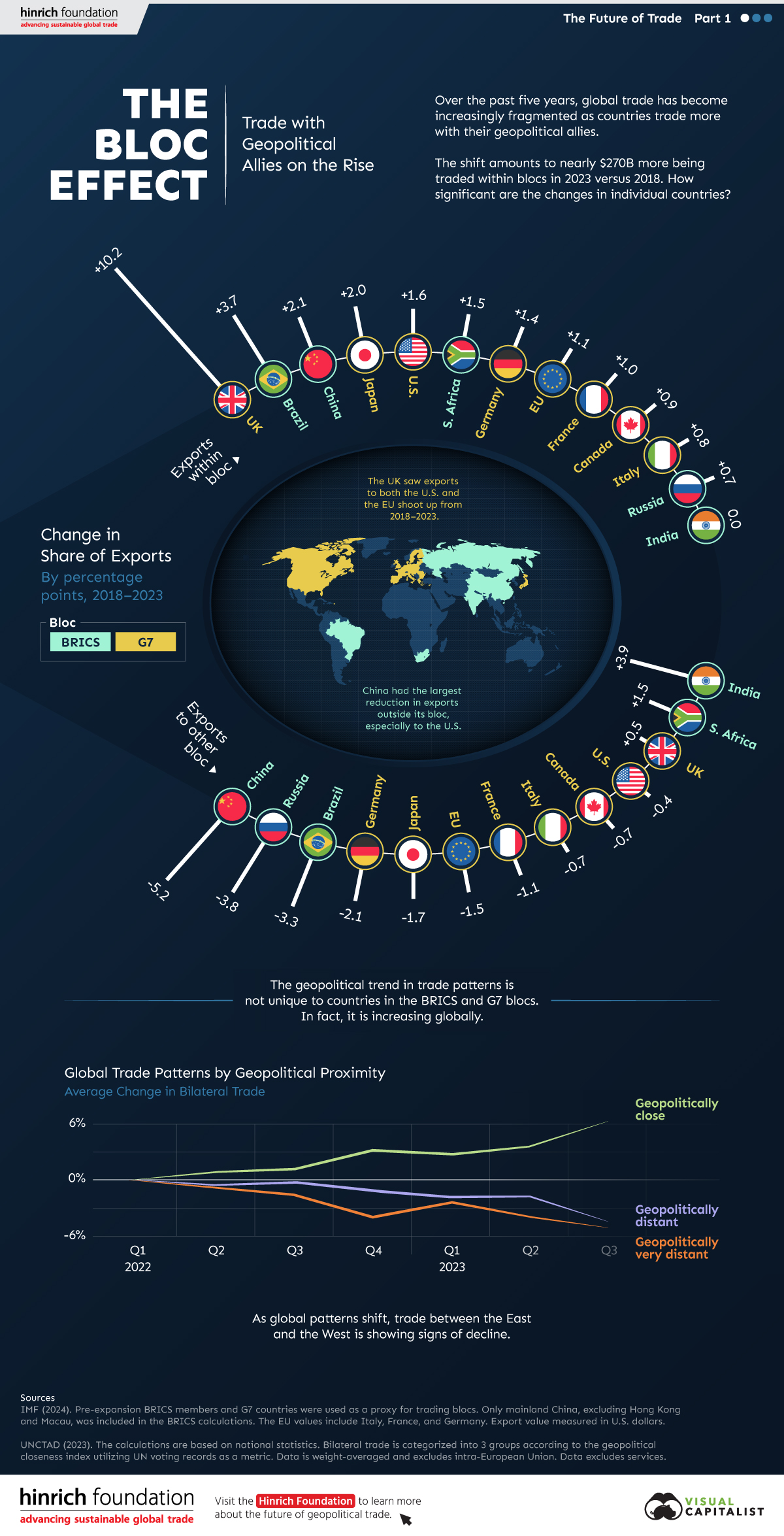Politics
The Year in News 2015
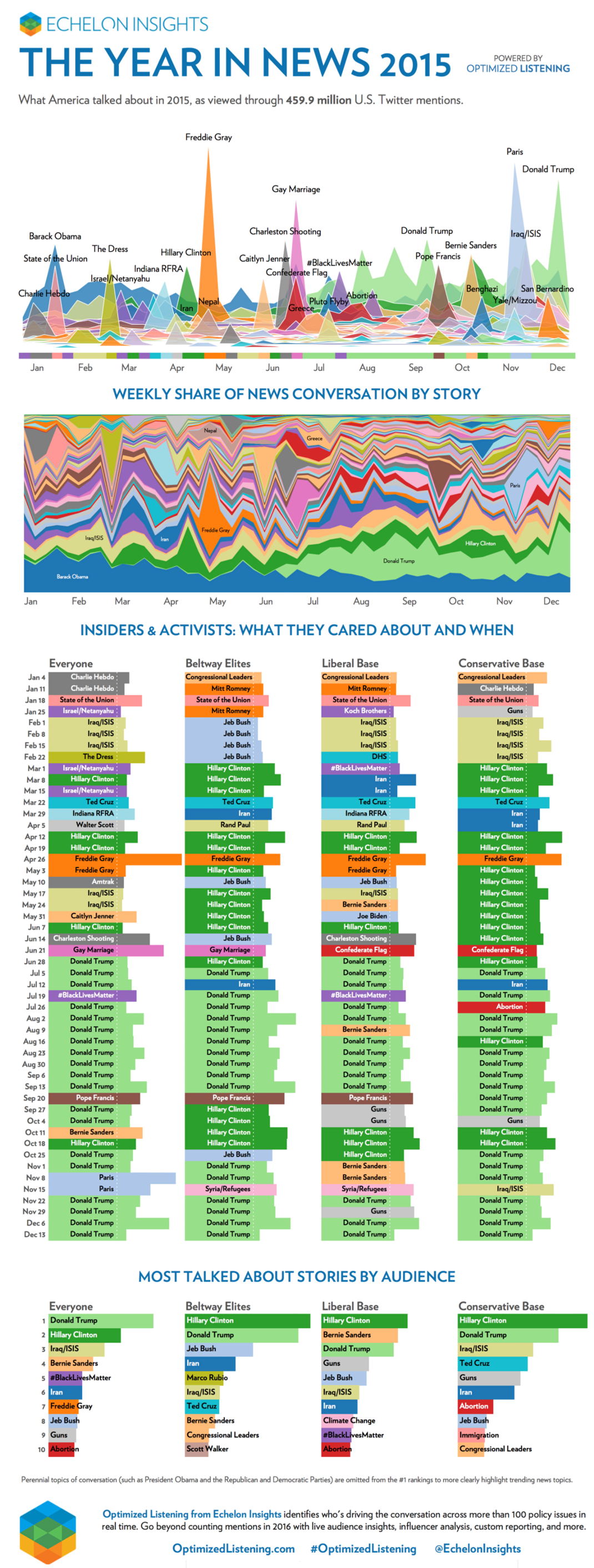
The Year in News 2015
Every social media platform has a differentiating factor that determines how it’s used. LinkedIn, for example, is best suited for networking and business, while Instagram is designed to share photos.
The key differentiation of Twitter has become clear over time: it allows users to stay on top of news and events that are trending all over the world in real-time. It also gives politicians, media, business leaders, and celebrities a soapbox to get their opinions out to the general public. This creates a natural feedback loop to reinforce what is “trending” at any given time.
Echelon Insights, a market research company, has taken advantage of Twitter’s gold mine of data to create a visualization of news in 2015. By analyzing 459.9 million tweets from Americans over the course of the last year, we can now see what topics trended, along with the timing and magnitude of each trending topic.
To ensure that trending news stood out, Echelon Insights removed some of the data outliers related to perennial conversations that get mentions, including President Obama (55 million mentions) and the Republican and Democratic parties. With that filter applied, the most discussed person or issue in the news this year was Donald Trump, with 43 million U.S. mentions, followed by Hillary Clinton, with 31.5 million.
Most Popular News Stories of 2015
| Subject | Number of tweets |
|---|---|
| Donald Trump | 43.0 million |
| Hillary Clinton | 31.5 million |
| Iraq & ISIS | 24.0 million |
| Bernie Sanders | 19.2 million |
| #BlackLivesMatter | 15.0 million |
| Iran | 14.8 million |
| Freddie Gray | 13.1 million |
| Jeb Bush | 12.5 million |
| Guns | 11.8 million |
| Planned Parenthood | 11.2 million |
The above trending topics were relatively steady and newsworthy throughout the year. However, Echelon also tried to get an idea of the news stories that “spiked” the most by filtering out some of the more constant topics of conversation. Here are the top five stories along with the mentions they gained in the week that they dominated headlines:
Top 5 News Events of 2015
| Top Events | Number of tweets |
|---|---|
| The Paris attacks, Nov. 8–15 | 8.9 million |
| Freddie Gray & Baltimore, Apr. 26-May 3 | 7.1 million |
| Donald Trump & Muslim immigration, Dec. 6: | 5.0 million |
| The Supreme Court legalizes gay marriage nationwide, Jun. 21 | 4.9 million |
| The Charleston shooting, Jun. 14 | 3.2 million |
The terror attacks in Paris dominated all headlines with 8.9 million tweets. Here’s a final look at the data, except this time it is the same filtered data visualized by mentions per day.
Economy
The Bloc Effect: International Trade with Geopolitical Allies on the Rise
Rising geopolitical tensions are shaping the future of international trade, but what is the effect on trading among G7 and BRICS countries?
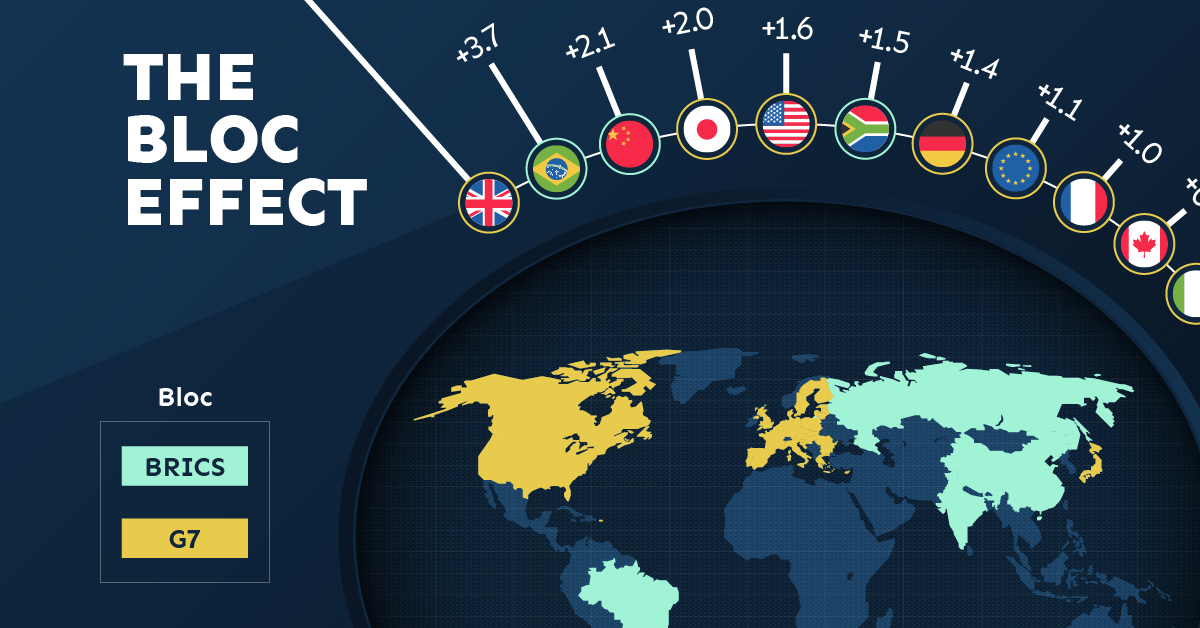
The Bloc Effect: International Trade with Allies on the Rise
International trade has become increasingly fragmented over the last five years as countries have shifted to trading more with their geopolitical allies.
This graphic from The Hinrich Foundation, the first in a three-part series covering the future of trade, provides visual context to the growing divide in trade in G7 and pre-expansion BRICS countries, which are used as proxies for geopolitical blocs.
Trade Shifts in G7 and BRICS Countries
This analysis uses IMF data to examine differences in shares of exports within and between trading blocs from 2018 to 2023. For example, we looked at the percentage of China’s exports with other BRICS members as well as with G7 members to see how these proportions shifted in percentage points (pp) over time.
Countries traded nearly $270 billion more with allies in 2023 compared to 2018. This shift came at the expense of trade with rival blocs, which saw a decline of $314 billion.
Country Change in Exports Within Bloc (pp) Change in Exports With Other Bloc (pp)
🇮🇳 India 0.0 3.9
🇷🇺 Russia 0.7 -3.8
🇮🇹 Italy 0.8 -0.7
🇨🇦 Canada 0.9 -0.7
🇫🇷 France 1.0 -1.1
🇪🇺 EU 1.1 -1.5
🇩🇪 Germany 1.4 -2.1
🇿🇦 South Africa 1.5 1.5
🇺🇸 U.S. 1.6 -0.4
🇯🇵 Japan 2.0 -1.7
🇨🇳 China 2.1 -5.2
🇧🇷 Brazil 3.7 -3.3
🇬🇧 UK 10.2 0.5
All shifts reported are in percentage points. For example, the EU saw its share of exports to G7 countries rise from 74.3% in 2018 to 75.4% in 2023, which equates to a 1.1 percentage point increase.
The UK saw the largest uptick in trading with other countries within the G7 (+10.2 percentage points), namely the EU, as the post-Brexit trade slump to the region recovered.
Meanwhile, the U.S.-China trade dispute caused China’s share of exports to the G7 to fall by 5.2 percentage points from 2018 to 2023, the largest decline in our sample set. In fact, partly as a result of the conflict, the U.S. has by far the highest number of harmful tariffs in place.
The Russia-Ukraine War and ensuing sanctions by the West contributed to Russia’s share of exports to the G7 falling by 3.8 percentage points over the same timeframe.
India, South Africa, and the UK bucked the trend and continued to witness advances in exports with the opposing bloc.
Average Trade Shifts of G7 and BRICS Blocs
Though results varied significantly on a country-by-country basis, the broader trend towards favoring geopolitical allies in international trade is clear.
Bloc Change in Exports Within Bloc (pp) Change in Exports With Other Bloc (pp)
Average 2.1 -1.1
BRICS 1.6 -1.4
G7 incl. EU 2.4 -1.0
Overall, BRICS countries saw a larger shift away from exports with the other bloc, while for G7 countries the shift within their own bloc was more pronounced. This implies that though BRICS countries are trading less with the G7, they are relying more on trade partners outside their bloc to make up for the lost G7 share.
A Global Shift in International Trade and Geopolitical Proximity
The movement towards strengthening trade relations based on geopolitical proximity is a global trend.
The United Nations categorizes countries along a scale of geopolitical proximity based on UN voting records.
According to the organization’s analysis, international trade between geopolitically close countries rose from the first quarter of 2022 (when Russia first invaded Ukraine) to the third quarter of 2023 by over 6%. Conversely, trade with geopolitically distant countries declined.
The second piece in this series will explore China’s gradual move away from using the U.S. dollar in trade settlements.

Visit the Hinrich Foundation to learn more about the future of geopolitical trade

-
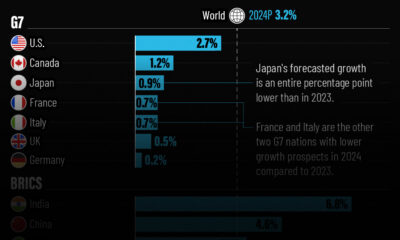
 Economy1 day ago
Economy1 day agoEconomic Growth Forecasts for G7 and BRICS Countries in 2024
The IMF has released its economic growth forecasts for 2024. How do the G7 and BRICS countries compare?
-

 United States2 weeks ago
United States2 weeks agoRanked: The Largest U.S. Corporations by Number of Employees
We visualized the top U.S. companies by employees, revealing the massive scale of retailers like Walmart, Target, and Home Depot.
-

 Economy2 weeks ago
Economy2 weeks agoWhere U.S. Inflation Hit the Hardest in March 2024
We visualized product categories that saw the highest % increase in price due to U.S. inflation as of March 2024.
-
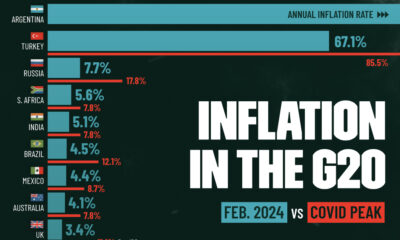
 Economy4 weeks ago
Economy4 weeks agoG20 Inflation Rates: Feb 2024 vs COVID Peak
We visualize inflation rates across G20 countries as of Feb 2024, in the context of their COVID-19 pandemic peak.
-

 Economy1 month ago
Economy1 month agoMapped: Unemployment Claims by State
This visual heatmap of unemployment claims by state highlights New York, California, and Alaska leading the country by a wide margin.
-
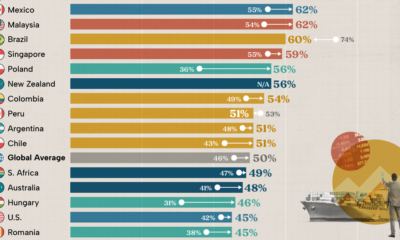
 Economy2 months ago
Economy2 months agoConfidence in the Global Economy, by Country
Will the global economy be stronger in 2024 than in 2023?
-
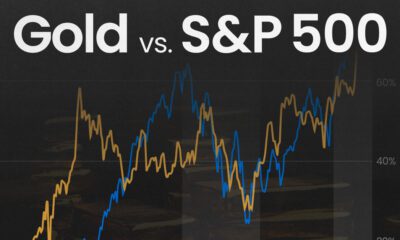
 Mining1 week ago
Mining1 week agoGold vs. S&P 500: Which Has Grown More Over Five Years?
-

 Markets2 weeks ago
Markets2 weeks agoRanked: The Most Valuable Housing Markets in America
-

 Money2 weeks ago
Money2 weeks agoWhich States Have the Highest Minimum Wage in America?
-

 AI2 weeks ago
AI2 weeks agoRanked: Semiconductor Companies by Industry Revenue Share
-

 Markets2 weeks ago
Markets2 weeks agoRanked: The World’s Top Flight Routes, by Revenue
-

 Countries2 weeks ago
Countries2 weeks agoPopulation Projections: The World’s 6 Largest Countries in 2075
-

 Markets2 weeks ago
Markets2 weeks agoThe Top 10 States by Real GDP Growth in 2023
-

 Demographics2 weeks ago
Demographics2 weeks agoThe Smallest Gender Wage Gaps in OECD Countries
